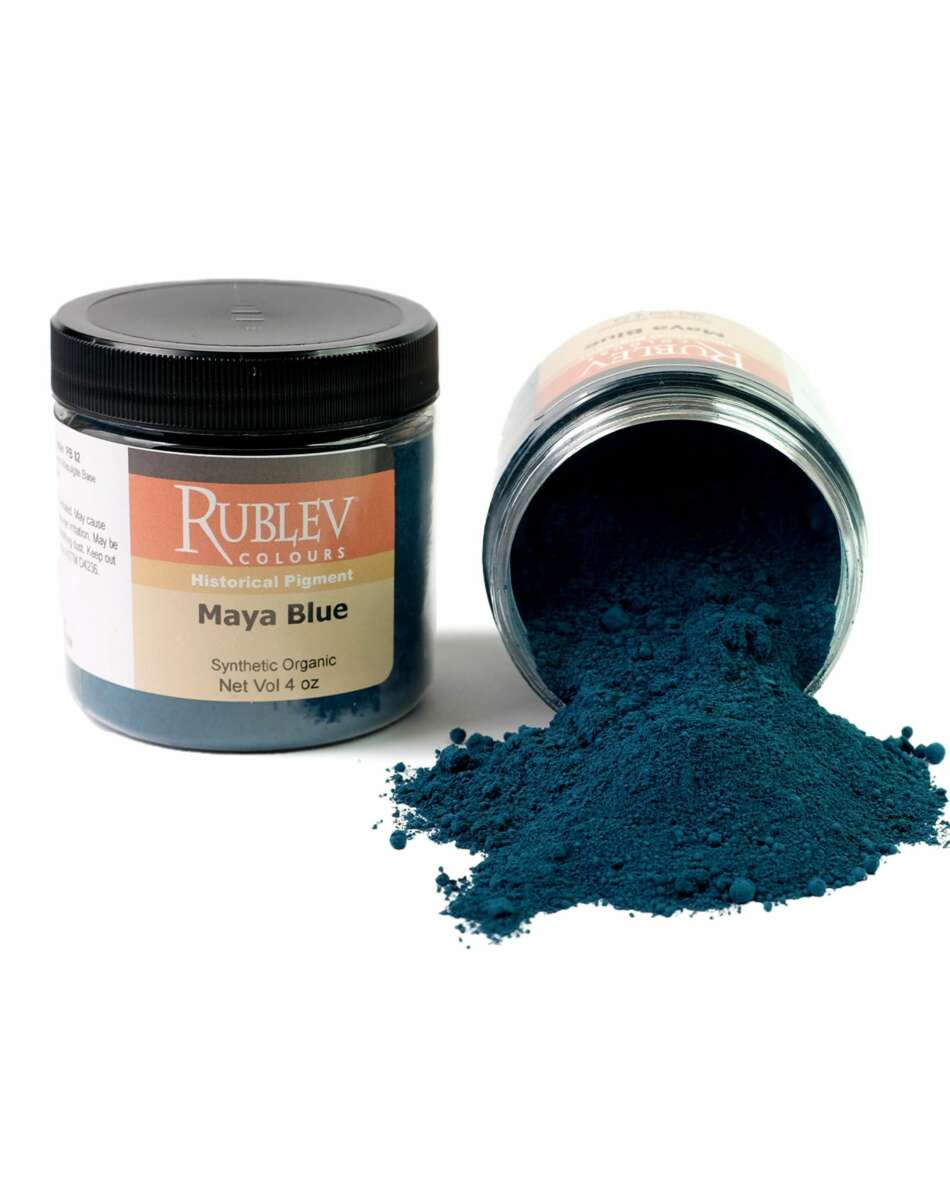Maya Blue Pigment
Developed by the Maya who ruled Mesoamerica from about 290 to 900 C.E., is a remarkable pigment based on a blue dye precipitated onto clay.
Maya Blue The blue is perhaps the most striking color used by Maya artists, a color so extraordinary that it generated much research and debate among scientists for more than 50 years. What is particularly interesting about Maya Blue is that, despite long exposure to light and high humidity for centuries, it hardly fades. Its unprecedented stability, defies exposure to alkalies, acids and chemical solvents. Maya Blue is a mixture of both inorganic (paylgorskite clay) and organic (blue dye) elements—no known organic pigments today can come close to the stability of Maya Blue over so many years.
| Pigment Names | |||||||
| Common Names (rock): | English: Maya blue French: bleu de Maya German: Maya Blau Italian: azzurro di Maya Spanish: azul Maya | ||||||
| Nomenclature: |
| ||||||
| Pigment Information | |
| Color: | Blue |
| Pigment Classification: | Synthetic Organic |
| Colour Index: | Pigment Blue 82 |
| Chemical Name: | – |
| Chemical Formula: | – |
| CAS No.: | – |
| Series No.: | 4 |
| ASTM Lightfastness | |
| Acrylic: | Not Listed |
| Oil: | Not Listed |
| Watercolor: | Not Listed |
| Physical Properties | |
| Particle Size (mean): | 2 microns |
| Density: | 2.00 g/cm3 |
| Hardness: | – |
| Refractive Index: | 1.56–1.662 |
| Oil Absorption: | 65 grams oil / 100 grams pigment |
| Health and Safety | There are no acute or known chronic health hazards associated with the anticipated use of this product (most chemicals are not fully tested for chronic toxicity). Always protect yourself against potentially unknown chronic hazards of this and other chemical products by keeping them out of your body. Do this by avoiding ingestion, excessive skin contact, and inhalation of spraying mists, sanding dusts and vapors from heating. Conforms to ASTM D-4236. |
For a detailed explanation of the terms in the table above, please visit Composition and Permanence.
Origin and History
Maya Blue was developed by the Maya occupying Mesoamerica for the first millennium C.E. Today, a U.S. company has unlocked the secrets of Maya Blue and patented the process to create hybrid organic/inorganic pigments based on research to find the origin of the blue color.
Source
Our Maya Blue is made by Mayan Pigments, and is based on the process they developed that recreates the Maya blue pigment found in Mesoamerican artifacts and archaelogical sites. The process involves heat-treating synthetic indigo dye with palygorskite (formerly known as attaplugite) clay.
Permanence and Compatibility
Maya Blue is remarkably stable in acids, alkalis, and solvents, so it is suitable for almost all artists' mediums, including fresco and casein.
Oil Absorption and Grinding
Maya Blue absorbs a moderately high amount of oil (65 grams of linseed oil per 100 grams of pigment) to make a paste.
Toxicity
Maya Blue is not considered toxic, however, care should be used in handling the dry powder pigment to avoid inhaling the dust.
For more information on how to handle pigments safely, please visit How to Safely Handle Art Materials and Pigments.
| SKU | 417-16 |
|---|---|
| Brand | Rublev Colours |
| Vendor | Natural Pigments |
| Processing Time | Usually ships the next business day. |
| Color | Blue |
| Pigment Type | Inorganic, Historical, Synthetic |



